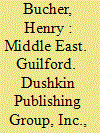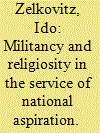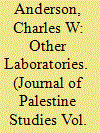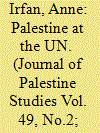|
|
|
Sort Order |
|
|
|
Items / Page
|
|
|
|
|
|
|
| Srl | Item |
| 1 |
ID:
139908


|
|
|
|
|
| Summary/Abstract |
This article explores a covert partnership between a prominent Zionist agronomist, Menashe Meirovitch, and the Christian Arab editor of the newspaper Filastin, ʿIsa al-ʿIsa, a founding father of Palestinian nationalism. Under the literary guise of an Arab Muslim peasant called Abu Ibrahim, the two men produced a series of Arabic-language columns in 1911–12 that exhibited imperial citizenship par excellence, demanding political and agrarian reforms in Palestine in the name of strengthening the Ottoman Empire. The article explores their short-lived political alliance to interrogate historiographical uses of the press as a source for social history. Moreover, it challenges the portrayal of cooperation between Jews and Arabs as “collaboration” in its pejorative sense. Far from a simple story of betrayal or corruption, the partnership between the two men demonstrates how a shared commitment to Ottoman modernism brought them together more than nationalism, language, or religion pulled them apart.
|
|
|
|
|
|
|
|
|
|
|
|
|
|
|
|
| 2 |
ID:
039069


|
|
|
|
|
| Publication |
Dushkin aPublishing Group, Lnc, Dushkin Publishing Group, Inc., 1984.
|
| Description |
x, 150p.pbk
|
| Series |
Third World Series
|
| Standard Number |
0879674989
|
|
|
|
|
|
|
|
|
|
|
|
Copies: C:1/I:0,R:0,Q:0
Circulation
| Accession# | Call# | Current Location | Status | Policy | Location |
| 025105 | 956/BUC 025105 | Main | On Shelf | General | |
|
|
|
|
| 3 |
ID:
141618


|
|
|
|
|
| Summary/Abstract |
As with other Arab identities, Palestinian identity is a product of myriad converging ideologies. In retrospect, its development was accompanied by dominant Middle Eastern ideologies, such as Arab nationalism, pan-Islamism and the rise of political Islam. Against this backdrop, the article discusses Islam's historical affinity and social role in the formative period of the Fatah revolutionary national movement. Both ideologically and socially, Islam was central to Fatah's ethic and served as an important tool for recruiting the masses to the Palestinian revolution.
|
|
|
|
|
|
|
|
|
|
|
|
|
|
|
|
| 4 |
ID:
180233


|
|
|
|
|
| Summary/Abstract |
This essay briefly examines a pattern of little-known local and general strikes staged by the Palestinian public during 1938, amid the Palestinian uprising known as the Great Revolt. While largely overshadowed by the armed struggle then underway, these nonviolent strikes illustrate the widespread character of Indigenous resistance to British colonial rule and of support for the rebellion. Palestine has often been described as a laboratory for repression; yet when we attend to Palestinian social history, we also see that it has been a laboratory of freedom struggle, popular resilience, and recurrent waves of activism and tactical experimentation.
|
|
|
|
|
|
|
|
|
|
|
|
|
|
|
|
| 5 |
ID:
172906


|
|
|
|
|
| Summary/Abstract |
This article examines the relationship of the Palestine Liberation Organization (PLO) to the United Nations Relief and Works Agency for Palestine Refugees in the Near East (UNRWA) during the 1970s, the period when the PLO reached the zenith of its power in Palestinian refugee camps throughout the Levant. Based on archival United Nations (UN) and UNRWA documents, as well as the PLO's own communications and publications, the article argues that the organization approached its relationship with UNRWA as part of a broader strategy to gain international legitimacy at the UN. That approach resulted in a complex set of tensions, specifically over which of the two institutions truly served and represented Palestinian refugees. In exploring these tensions, this article also demonstrates how the “question of Palestine” was in many ways an international issue.
|
|
|
|
|
|
|
|
|
|
|
|
|
|
|
|
| 6 |
ID:
093690


|
|
|
|
|
| Publication |
2009.
|
| Summary/Abstract |
This article focuses on transformation of collective identity in the West Bank and Gaza Strip after the 'Nakba' (catastrophe) of 1948. The article argues that Arab identity, which was dominant in Palestine during the Mandate period, continued to be dominant after the 'Nakba'. The weak Palestinian identity started to strengthen continuously among all Palestinians after the June War of 1967. In the Israeli occupied West Bank and Gaza Strip, Palestinian identity greatly intensified and became the strongest identity in the last two to three decades. Comparison of collective identity before and after the Oslo Agreement shows that while under the Palestinian Authority (PA), Palestinian identity remained the strongest identity, Muslim identity and clan (or hamula) identity have greatly intensified.
|
|
|
|
|
|
|
|
|
|
|
|
|
|
|
|
| 7 |
ID:
119474


|
|
|
|
|
| Publication |
2013.
|
| Summary/Abstract |
â??B oth P alestinian nationalism and Z ionism, as concepts, embody the same principle; namely both are nationalist movements based on the requirement of a homeland for their own people.â? 1 The critical problem, however, seems to be that both have been claiming the same piece of land for their homelands, and thus the source of trouble is more practical than ideological. Contrary to the assumption hidden in this articleâ??s given title, political ideologies do not recognize nor reconcile with each other, nor do they determine who recognizes whom and who reconcile with whom. It is only individuals, and sometimes also collectives, whoâ??metaphorically speakingâ??initiate or undergo such modifications of relationship. Individuals tend to justify changes in their personal relations by terms that are either emotional ( e.g., fallen in love with her, cannot stand him anymore) or based on moral-normative grounds ( e.g., he behaved decently, she promised, yet . . .). Collectives, on the other hand, often rely on political ideologies as their justificationâ??or excuseâ??for moving from one state of relations with another collective to a different state. Yet, as the dominant Political Realist school argues, particularly, although not only, on the collective/national level, inter-relations are first and foremost determined by needs and interests of the actors. Ideologies are just the legitimizing hooks to hang on, not the genuine source of or the motivation for such a change.
|
|
|
|
|
|
|
|
|
|
|
|
|
|
|
|
|
|
|
|
|